_crop.jpg)
Our 2020 Student Profiles
- Oliver Burman
- Hannah Cooke
- Rachel Healy
- Charlotte Hudlerová
- Jake Samuel
- Vincent Saverat
- Hannan Seyal
- Karen Zhu
- Aileen Cooney
- Sabrina Pia Nuccio
- Lino Prados Martin
- Katherine McPhie
- James Zhang
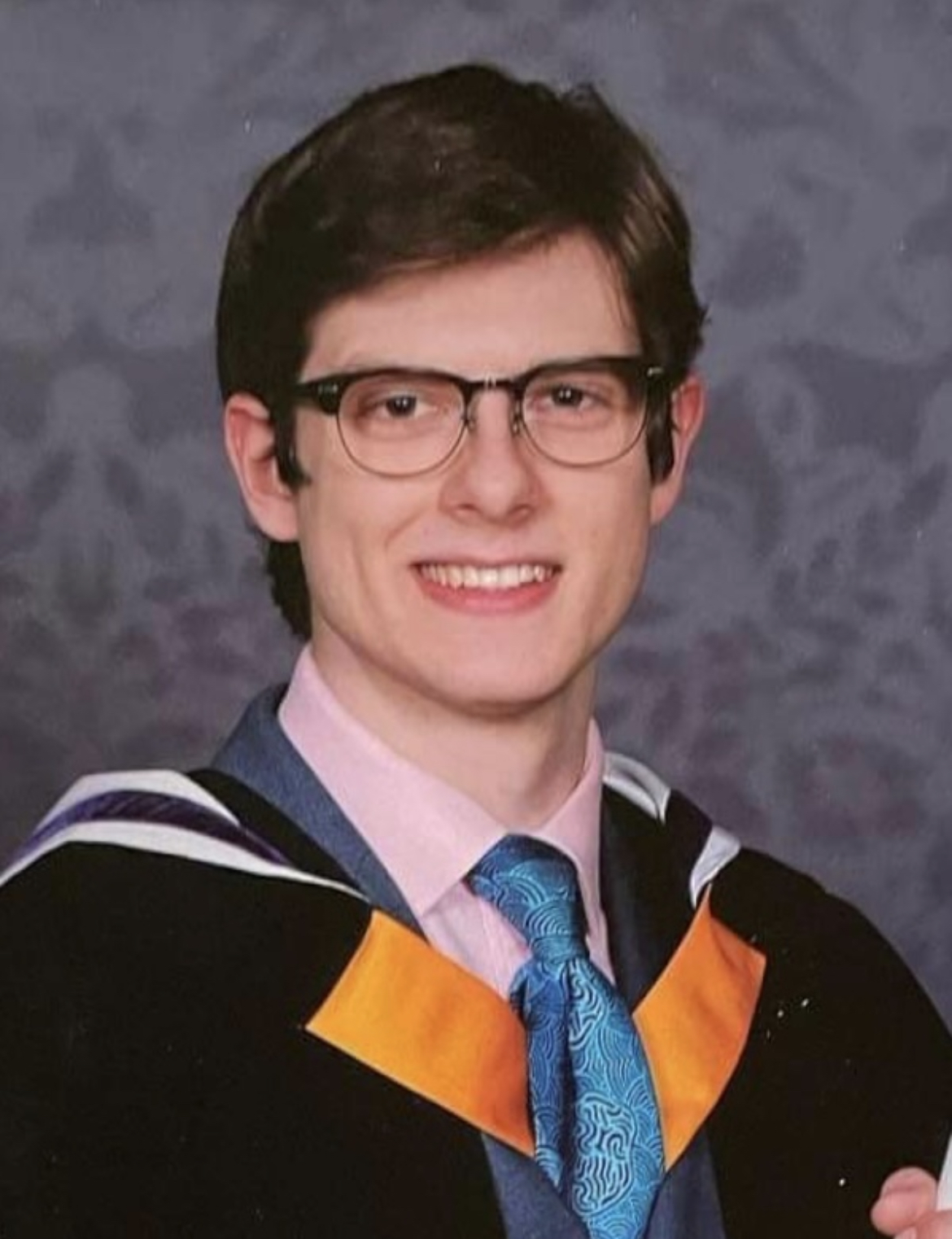 Name
Name
Oliver Burman
Project Title
Next-generation biosensors for real-time, enhanced sensitivity antigen detection
This project is co-sponsored by the Institute of Chemical Biology EPSRC Centre for Doctoral Training and the Defence and Science Technology Laboratory
What were you doing before enrolling in the ICB CDT Programme?
I was studying an MSci in Chemistry with Molecular Physics at Imperial College London.
Why did you choose to apply for your particular project?
I had already worked with Dr. Aleksandar Ivanov and Prof. Joshua Edel on a project during my undergraduate which gave me a love for research that I hadn’t gotten from laboratory work before. Combined with the chance to collaborate with the Defence and Science Technology Laboratory with my other supervisor, Dr. Sarah Goodchild, on a project to work towards designing biosensors it was a no brainer to apply.
What are you looking forward to the most within the CDT programme?
Good results! Success within the PhD definitely comes as peaks and troughs but very little is as satisfying as getting good data in the lab and things working as they theoretically should.
Please tell us a fun fact about yourself!
I love dogs, I have three Labradors.
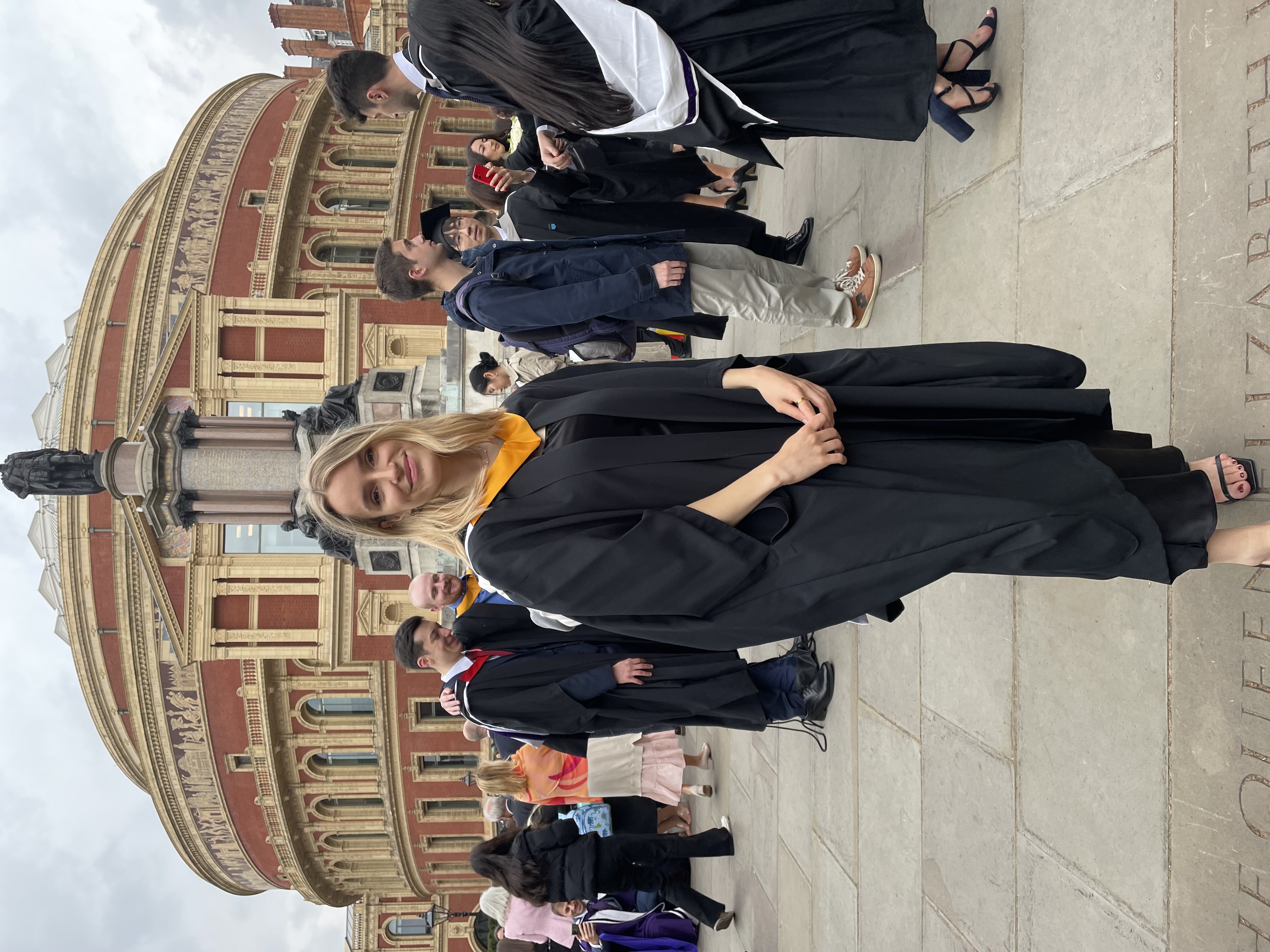 Name
Name
Hannah Cooke
Project Title
Compartmentalised bio-membrane capsules as novel vaccine technologies
This project is co-sponsored by the Institute of Chemical Biology EPSRC Centre for Doctoral Training and GSK
What were you doing before enrolling in the ICB CDT Programme?
Before my PhD, I was undertaking an integrated master’s in chemistry (MChem) at the University of York, with my final year masters project supervised by Prof. David K Smith.
Why did you choose to apply for your particular project?
As I was writing up my master’s thesis at the York, I realised that I wasn’t ready to leave research, and so began searching for PhDs. This particular project aligned closely with areas that I had found interesting in my previous project, and therefore felt like the right direction to continue my research. The multidisciplinary nature of the ICB CDT also appealed greatly to me, along with the opportunity to train in additional areas like sci comm and human centred design. My PhD project is also in collaboration with GSK, through which I have developed a good professional relationship.
What are you looking forward to the most within the CDT programme?
The ICB CDT has enabled me to develop so many important skills in addition to my PhD research, and I am excited to continue to develop these further. I’m also excited to collaborate with colleagues in research, many of which are from different science background to myself and am therefore excited to see how this benefits my research.
Please tell us a fun fact about yourself!
I recently had my 15 seconds of fame by appearing in the Royal Institution’s Christmas Lectures during an internship there working on the production of the lectures.
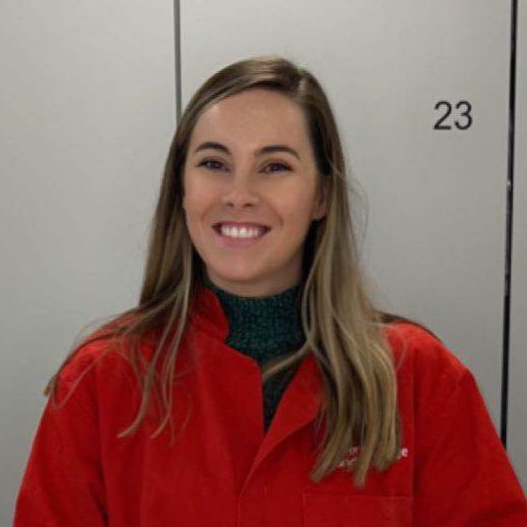 Name
Name
Rachel Healy
Project Title
Biomechanics of tumour cell extrusion and migration leading to metastasis using micron scale devices.
This project is jointly funded by the CRUK Imperial Centre and Institute of Chemical Biology EPSRC Centre for Doctoral Training as a 4 year PhD
What were you doing before enrolling in the ICB CDT Programme?
I did a BSc in genetics in University College Cork, I then took a year out to work and save before completing an MSc in Molecular Medicine at Imperial.
Why did you choose to apply for your particular project?
I was introduced to ‘organ on a chip’ microfluidic devices during my MSc and found the area fascinating. Microfluidic devices are a very interesting way to model and study cellular processes and diseases. I am also passionate about cancer research and my current PhD uses microfluidics to help understand the mechanisms involved in tumour cell metastasis.
What are you looking forward to the most within the CDT programme?
The CDT offers a wide range of transferable skills, and I am particularly interested in science communication events and workshops.
Please tell us a fun fact about yourself!
I worked as a chef throughout my time at university and I loved it.
 Name
Name
Charlotte Hudlerová
Project Title
Ultrasensitive prostate cancer screening based on miRNA sensing from whole blood
What were you doing before enrolling in the ICB CDT Programme?
MRes in Cancer Biology at Imperial College London
Why did you choose to apply for your particular project?
I chose to apply for this project because, as a cancer biologist, the multidisciplinary nature involving chemistry and bioengineering appealed to me. I believe that this collaborative approach is essential for tackling the complexities of cancer and finding innovative solutions. Additionally, the project's focus on cancer screening aligns perfectly with my commitment to early detection strategies, which are crucial for improving patient outcomes. I am excited about the potential impact on personalised therapies and treatment strategies.
What are you looking forward to the most within the CDT programme?
I'm looking forward to the diverse business and “soft” skills courses, that will help me translate research into practical applications and enhance my overall professional development.
Please tell us a fun fact about yourself!
Former national softball champion, yet I still enjoy laid-back game of catch.
 Name
Name
Jake Samuel
Project Title
Cell-engineered synthetic chylomicrons for oral drug delivery applications
What were you doing before enrolling in the ICB CDT Programme?
I was undertaking an MRes in Biomedical Sciences at Imperial College London under the guidance of Dr. Blerina Ahmetaj-Shala, Dr. Nick Kirkby and Prof. Jane Mitchell.
Why did you choose to apply for your particular project?
This project was appealing to me for several reasons:
- The ICB CDT provides a vast amount of training outside of your PhD studies such as a media skills course with the BBC and the EVOLVE placement scheme.
- This project is very multidisciplinary and has consequently fostered many new collaborations. For example, I have had the chance to work at the University of Oxford with Dr. Paul Holloway to develop 3-D lymphatic networks and at Queen Mary University of London with Dr. Clare Thompson to produce a model of the intestinal lymphatics.
- My supervisors Dr. Nazila Kamaly and Prof. Oscar Ces have a strong track record of producing PhD graduates that go on to have successful careers in their respective fields.
What are you looking forward to the most within the CDT programme?
The thing I looked forward to the most was the BOOST scheme. This is an initiative ran by the ICB CDT to provide students with funding to develop a start-up idea further. Myself, Hannah Cooke (ICL; ICB CDT) and Jonathan Bradshaw (ICL; iCase) were awarded £2000 to produce a prototype for a device that could detect heteroresistance in bacteria. We thoroughly enjoyed this experience and aim to use the BOOST scheme to leverage further funding in the future!
Please tell us a fun fact about yourself!
I once told someone in a pub they were the absolute spitting image of my hero and Nottingham Forest legend Joe Lolley, and he seemed very perplexed by this. I was only told later that the perplexed man was, in fact, my hero and Nottingham Forest legend Joe Lolley.
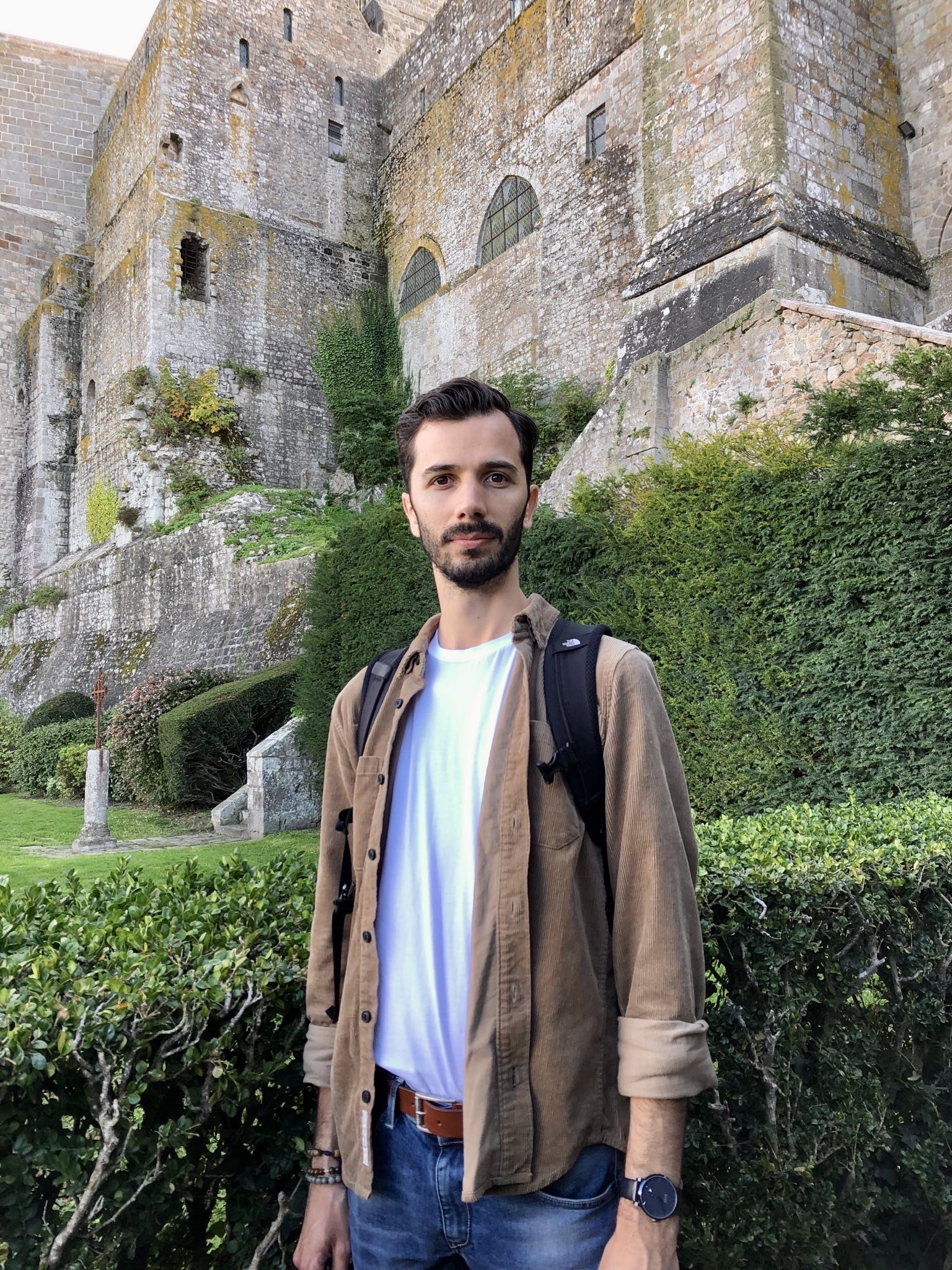 Name
Name
Vincent Saverat
Project Title
Directing protein modification in living systems with bifunctional molecules.
What were you doing before enrolling in the ICB CDT Programme?
Before joining the ICB CDT, I completed a master’s degree in chemistry and life sciences at Paris Sciences et Lettres University. As part of this master’s degree, I undertook a 5-month internship in the Kawamura group in Newcastle University where I worked on the development of a peptide-based probe against NSD2, a protein involved in genes expression.
Why did you choose to apply for your particular project?
I was looking for a PhD project where I could learn and use modern chemical biology techniques as well as diving fully into the biotechnology world. Very few labs were fully combining chemistry and biology and were often proposing medicinal chemistry project instead. With the project proposed by Ed Tate and supported by the ICB CDT and MSD, I was able to apply my chemistry knowledge in the design of bifunctional molecules while learning and using new techniques such as cloning, cells transfection, and the identification of proteins with immunoblotting and proteomics.
What are you looking forward to the most within the CDT programme?
The ICB CDT programme provided me with a lot of interdisciplinary skills. From the 4-day human-centred design retreat to the entrepreneurship BOOST grant, I believe that transferable skills gained from the ICB CDT extracurricular courses will help me for my future career outside academia. In fact, I am considering a career in Science Policy and will embark for a 3-month internship at the UK parliament where I seek to provide MPs and Peers with reliable and impartial scientific research. This placement is supported by the UKRI as well as the ICB CDT EVOLVE programme.
Please tell us a fun fact about yourself!
I am involved in the public engagement programme at the Francis Crick Institute, and we often do off-site science communication events. I think it is important that scientists and researcher reach out the wider community to explain what they are doing and how.
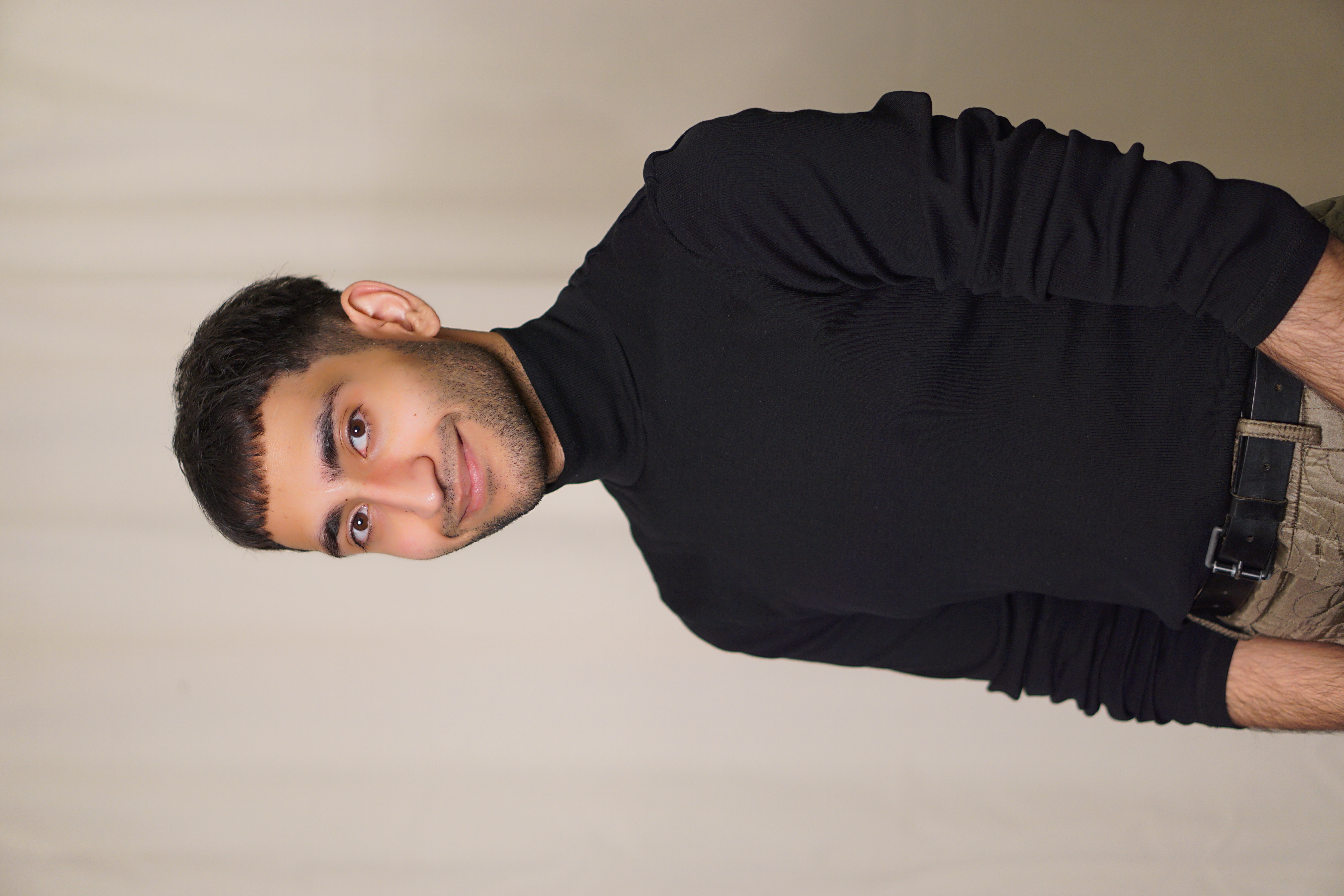 Name
Name
Hannan Seyal (he/him)
Project Title
Smart Bioisosteres: Beyond a spatial mimic to improved plant biology
Co-sponsored by the Institute of Chemical Biology EPSRC Centre for Doctoral Training and Syngenta
What were you doing before enrolling in the ICB CDT Programme?
Before joining the ICB at Imperial, I completed my MSci in Chemistry with Medicinal chemistry at the University of Glasgow. During my undergrad, I gained industrial research experience at F. Hoffmann la-Roche (Switzerland) within their medicinal chemistry department, and undertook a methodology driven total synthesis project within the Clark Group. I also come with an LLM in Medical Ethics, Human Rights and Intellectual Property, which I obtained through part-time study during my time at Glasgow.
Why did you choose to apply for your particular project?
I was keen to continue working at the interphase of chemistry and biology, developing novel methodologies with industrial applications. Working in partnership with Syngenta the project offers exciting opportunities to continue to develop my previous research experience in isostere development and investigations as well developing new ways to make biologically relevant molecules
What are you looking forward to the most within the CDT programme?
I’m excited to be part of the ICB CDT, developing skills not only within the scope of my project but also within the context of prototyping, coding (in HackEDU), business development (in Business Catalyst) and science communication. I am also looking forward to being part of a diverse cohort of scientists, learning more about the field and the interconnection between different research disciplines.
Please tell us a fun fact about yourself!
I am an avid baker and was shortlisted to be on the ‘Great British Bake off’ back when I was 17. Sadly, exam commitments prevented the potential television appearance(s).
 Name
Name
Karen Zhu
Project Title
Engineering synthetic cell translators to mediate human-cell communication
What were you doing before enrolling in the ICB CDT Programme?
I completed my MSci at Imperial doing Chemistry with Medicinal Chemistry afterwards I proceeded to complete a MRes as part of a 1+3 programme with the ICB CDT.
Why did you choose to apply for your particular project?
During my MSci final year project I performed research within the Membrane Biophysics Group and greatly enjoyed it so decided to pursue a PhD within the same group and field of research. The research interests me as it works at the interface between all of the sciences; with components based in biology, chemistry and physics, and helps us to understand the processes occurring within us. I work with a wide range of materials from proteins and DNA to nanoparticles and fluorocarbons so there is a wide range to experiment with and I have the freedom to delve into whatever avenues I would like without limiting myself to 1 specific discipline.
What are you looking forward to the most within the CDT programme?
The team bonding and educational retreats that have been offered by the CDT have encouraged the broadening of horizons and thinking outside the box, which can be difficult when one is so immersed in a small niche, as in a PhD. It is easy to lose oneself in ones’ research and these retreats and activities have been a welcome break to consider the bigger picture which has been really fun and educational.
The EVOLVE program that is offered as part of the CDT is also something that I hope I can do before the end of my PhD as it too offers the ability to explore outside of our research and think about more options outside of just academia.
Please tell us a fun fact about yourself!
I always end up knowing everyone’s secret santa every year (often by people asking for suggestions), and one year even deduced who was giving to me by eliminating everyone else.
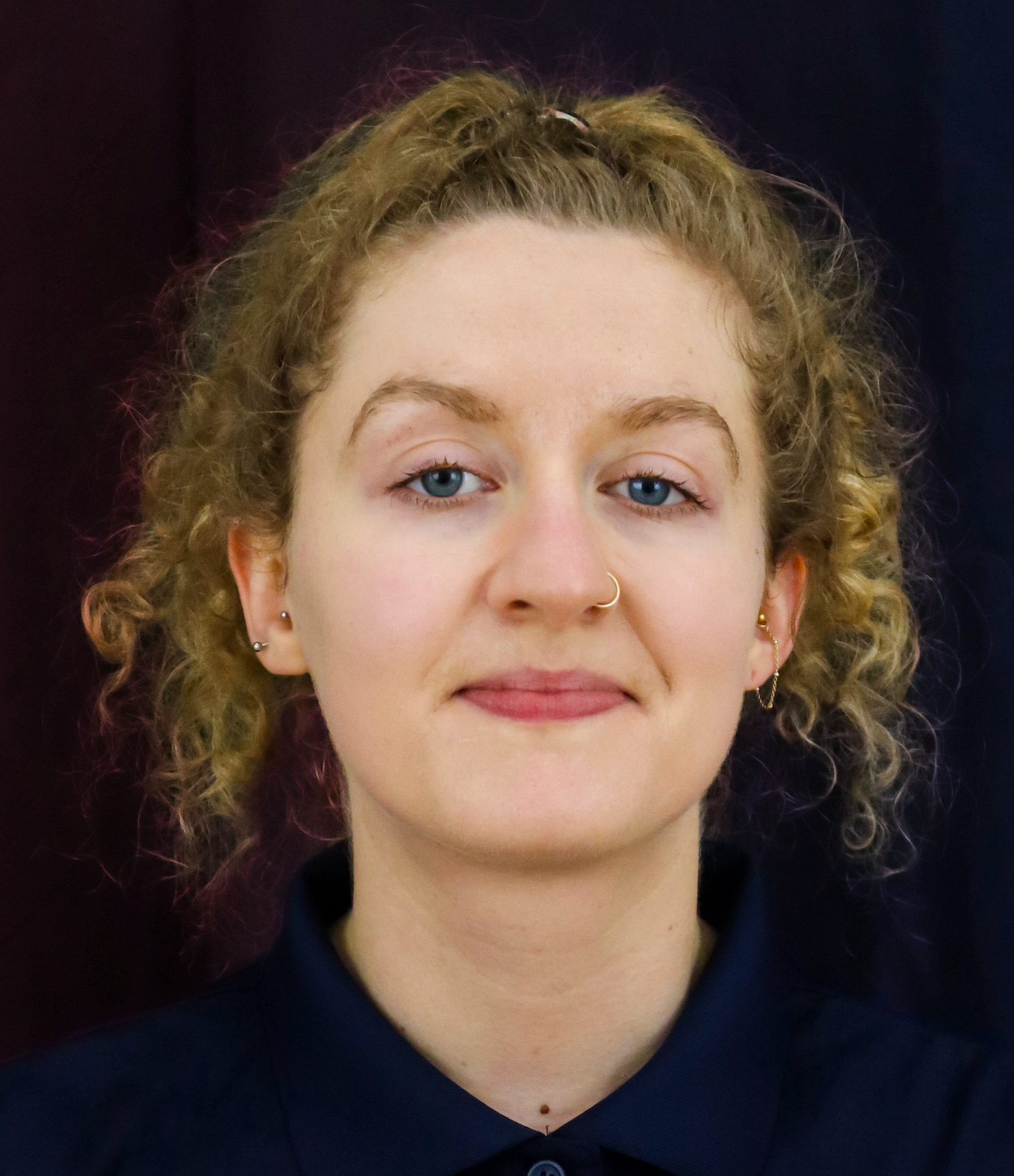 Name
Name
Aileen Cooney (she/her)
Project Title
Engineering motile artificial cells
What were you doing before enrolling in the ICB CDT Programme?
Living a happy existence in Tokyo whilst on the Daiwa Scholarship in Japan (if you are a UK citizen definitely check it out!)
This studentship is funded by the Leverhulme Doctoral Scholarships Centre for Cellular Bionics
Why did you choose to apply for your particular project?
The origin and engineering of life is something inherently interesting and so this project on artificial cells caught my eye. I was also interested in the interdisciplinary nature of chemistry, biophysics and engineering, and the opportunity to use lots of microscopy.
What are you looking forward to the most within the CDT programme?
The chance to develop non-technical skills such as in science communication and entrepreneurship. And of course meeting lots of new people!
Please tell us a fun fact about yourself!
I coach a women’s boxing class on Saturday mornings in East London – feel free to reach out if you’re interested in joining!
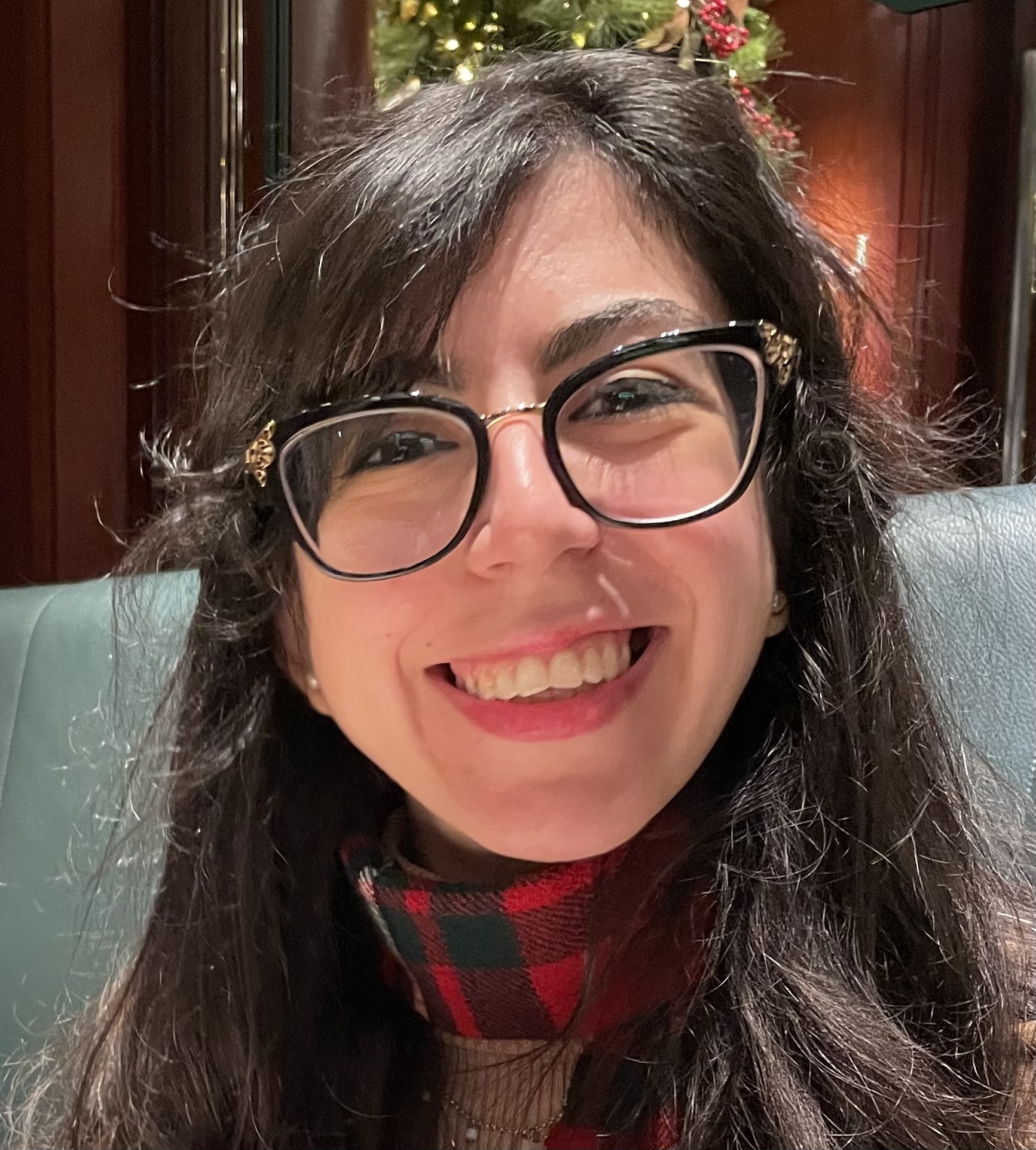 Name
Name
Sabrina Pia Nuccio
Project Title
Light-controlled editing of epigenetic modification in breast cancer cells
This studentship is funded by the Leverhulme Doctoral Scholarships Centre for Cellular Bionics
What were you doing before enrolling in the ICB CDT Programme?
I was part of a predoctoral program in Switzerland after my master, which involved one year of internships in different labs across Swiss universities to deepen my knowledge in genome engineering.
Why did you choose to apply for your particular project?
The driving force behind choosing my project was the perfect combination of my two favourite scientific topics: epigenetics and genome engineering, with a touch of chemistry. I have always believed that the mechanistic study of cancer biology can benefit from the application of chemistry in an attempt to untangle many current unanswered questions.
What are you looking forward to the most within the CDT programme?
The supportive environment of the CDT programme which fosters your growth from various perspectives, both scientifically and personally. It achieves this by organising diverse events that highlight multiple professional pathways a scientist can explore. Additionally, the programme encourages networking among students through a weekly breakfast event (making sure your morning starts in the right way)!
Please tell us a fun fact about yourself!
My 2024 resolutions include learning how to cycle (I was always afraid when I was a kid)!
 Name
Name
Lino Prados Martin
Project Title
Bi-directional optogenetic control of biohybrid actuators
This studentship is funded by the Leverhulme Doctoral Scholarships Centre for Cellular Bionics
What were you doing before enrolling in the ICB CDT Programme?
I was doing an MRes in Nanomaterials.
Why did you choose to apply for your particular project?
Project title: Bi-directional optogenetic control of biohybrid actuators
I decided to work on biohybrid actuators because it comprised multiple disciplines including tissue and genetic engineering, stem cell biology and microfabrication. All of these were areas that I was really interested on, and this multidisciplinary project was a really good way of combining them.
What are you looking forward to the most within the CDT programme?
Through my more than 3 years in the CDT programme I have developed not only scientific skills but also communication and social skills that I am sure will be very useful for my professional career in the future. Now I am looking forward to continue growing by putting together a good thesis and viva to finish the PhD.
Please tell us a fun fact about yourself!
Doing a PhD is being a really good and fun experience, but I don’t know how I ended up here, it never crossed my mind when I was a younger student.
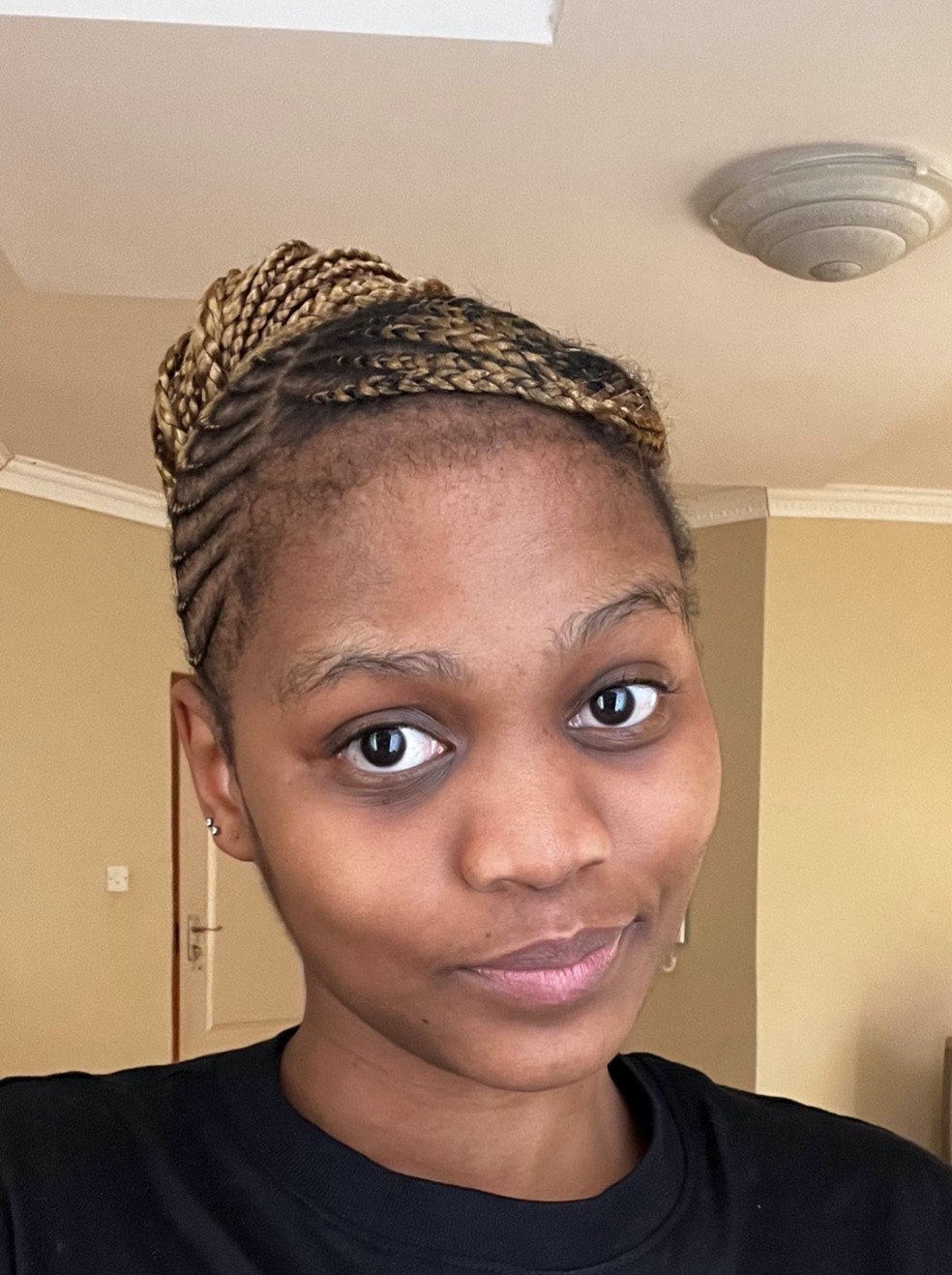 Name
Name
Katherine McPhie
Project Title
Chemical Biology Approaches to Study the Ubiquitin System
This project is funded by The Francis Crick Institute and the Department of Chemistry, Imperial College London.
What were you doing before enrolling in the ICB CDT Programme?
I completed my undergraduate integrated masters degree at the University of Strathclyde, in Glasgow, Scotland. My course was the MChem Chemistry with Drug Discovery, during which I got to spend a year studying abroad at Trinity College Dublin, and after that, a year in industry at GSK, Stevenage working in the medicinal chemistry team.
Why did you choose to apply for your particular project?
Before my PhD, I had a very organic synthesis and medicinal chemistry heavy background, and I wanted to take a step back and explore the whole drug discovery process, including the biological target evaluation and hit-finding stages, while still maintaining my chemistry skills. I’m based at the Francis Crick Institute which is an inspiring place to do a PhD, and the Rittinger Lab are a great team of people to work alongside! My PhD project is also in collaboration with GSK, so it’s been really helpful to have the expertise, resource and insight from an industry perspective too.
What are you looking forward to the most within the CDT programme?
There are so many training and development opportunities, and the CDT team are very supportive!
Please tell us a fun fact about yourself!
I had lived in three different countries before the age of 4, so I was a well-travelled toddler!
 Name
Name
James Zhang
Project Title
Investigating the mode of action of NMTi in neuroblastoma
This project is funded by CRUK Convergence Science Centre
What were you doing before enrolling in the ICB CDT Programme?
I was studying for a Masters in Chemistry.
Why did you choose to apply for your particular project?
I applied for this project as it was a multidisciplinary project, and allowed me to expand my skills beyond the organic synthetic skills I had developed previously.
What are you looking forward to the most within the CDT programme?
I’m nearing the end of my time with the CDT now, but I enjoyed getting to know the rest of my cohort especially during retreats.
Please tell us a fun fact about yourself!
I enjoy hip-hop dance in my free time.
2020 student projects

Jake Samuel
ICB CDT: Meet our students
Project Title: Cell-engineered synthetic chylomicrons for oral drug delivery applications
Jake obtained a first-class BSc in Biology at Swansea University, before working as a Research Technician at Mars Inc. for a year. He then studied for an MRes in Biomedical Research at Imperial where he received the Galen prize for excellence in medical research. He now works in the laboratory of Dr. Nazila Kamaly, where he is developing a biomimetic gut to investigate the lymphatic transport of drugs.

Hannan Seyal
ICB CDT: Meet our students
Project Title: Smart Bioisosteres: Beyond a spatial mimic to improved plant biology
Hannan joined the CDT in 2020, having completed an MSci in Chemistry with Medicinal Chemistry at the University of Glasgow, during which he carried out a 12-month internship at F. Hoffmann la-Roche, Switzerland, followed by his Masters’ project in the Clark Group. His previous research experience includes the design and synthesis of small molecules, including the use of computer aided design, and methodology for total synthesis, investigating 2-carbon ring expansions. Currently working in the Bull Group, in collaboration with Dr James Murray and Syngenta, his research focuses on the investigation and design of novel phenyl bioisosteres in agrochemistry.

Vincent Saverat
ICB CDT: Meet our students
Project Title: Directing protein modification in living systems with bifunctional molecules
Vincent graduated in Organic Chemistry at Paris-Saclay University, before further exploring his interest in biology through an MRes in Chemistry and Life Sciences jointly at Ecole Normale Supérieure and Paris Sciences et Lettres University. Funded by the EPSRC under the co-supervision of Prof. Ed Tate and Dr. Mark Rackham, Vincent’s PhD research focuses on using chemical biology approaches to investigate the role of protein S-acylation in cells. Outside of the lab, you may find him enjoying the diverse architecture of London or at home during rainy days reading The Economist.

Charlotte Hudlerova
ICB CDT: Meet our students
Project Title: Ultrasensitive prostate cancer screening based on miRNA sensing from whole blood
Charlotte joined the Institute of Chemical Biology at Imperial College London in October 2020 and is currently a PhD candidate. Previously, she completed a BSc in Molecular Biology at the University of Aberdeen (2019) and then an MRes in Cancer Biology at Imperial College (2020). In her current work, she seeks to improve the early detection of prostate cancer by developing multiplexed single-molecule binding assay utilising miRNAs and electro-optical nanopore platform under the supervision of Dr Sylvain Ladame, Prof Charlotte Bevan, Dr Aleksandar Ivanov and Prof Joshua Edel.

Oliver Burman
ICB CDT: Meet our students
Project Title: Next-generation biosensors for real-time, enhanced sensitivity antigen detection
Oliver Burman joined the Chemical Biology CDT programme at Imperial College London after graduating from Imperial in 2020 with an MSci in Chemistry with Molecular Physics. His research, co-funded by the ICB and Defence Science and Technology Laboratory, consists of using gold nanoparticles as molecular carriers, focusing on their self-assembly and the change in electro and optical signals that this creates.

Tom Kitto
ICB CDT: Meet our students
Project Title: A multifunctional biomimetic lab-on-a-chip assault course for agrochemical bioavailability screening
Tom is a 2020 CDT student within the Institute of Chemical Biology and is supervised by Oscar Ces, Yuval Elani, Laura Barter and Nazila Kamaly. His project is a collaboration between Syngenta and Imperial College London, where he will attempt to reconstruct the plant cell wall using synthetic biology technologies. He graduated in Chemical Engineering from the University of Bath, UK.

Rachel Healy
ICB CDT: Meet our students
Project Title: Biomechanical regulation of cell extrusion and migration during metastasis
Rachel joined the CDT as a PhD candidate in October 2020. She is co-supervised by Dr Sam Au (Bioengineering Department) and Professor Vania Braga (National Heart and Lung Institute).
Her research focuses on using microfluidic devices to investigate the biomechanics of tumour cell extrusion and migration leading to metastasis. She will explore how cell-cell and cell-ECM adhesions, intrinsic and extrinsic forces contribute to cell extrusion and migration in three dimensions.
Rachel has a BSc in Genetics from University College Cork, Ireland and completed her MSc in molecular medicine at Imperial College in 2020, where she was introduced to organ-on-chip devices. As part of her research, she was involved in the microfabrication of a pulmonary artery-on-a-chip-microfluidic device to model inflammatory responses of pulmonary arterial hypertension. She intends to use her knowledge of cancer biology and microfluidics to understand the fundamental mechanisms that drive tumour cell extrusion and migration.

Lino Prados Martin
ICB CDT: Meet our students
Project Title: Bionic Robotics: Autonomous Biohybrid Machines powered by skeletal muscle tissues
Lino Prados is currently a PhD student at Prof. Molly Stevens group researching soft robotics and point-of-care biosensing. He joined Imperial in 2019 to study an MRes in Nanomaterials after completing his BSc in Biomedical Engineering at Carlos III University of Madrid.
Lino is funded by the Leverhulme Trust and the EPSRC Centre for Doctoral Training.
Date last reviewed: 31 January 2024
Date last updated: 31 January 2024

